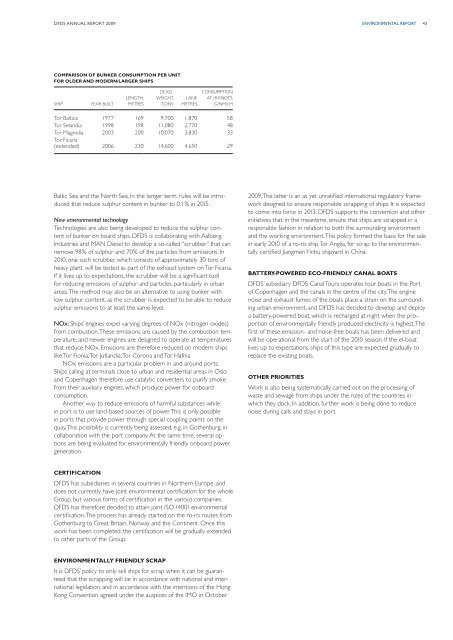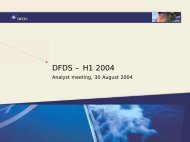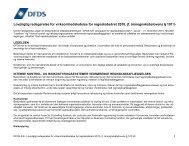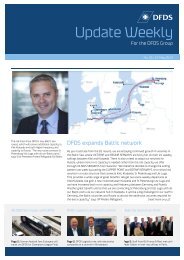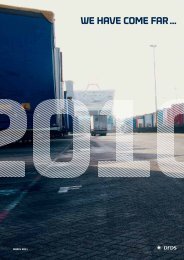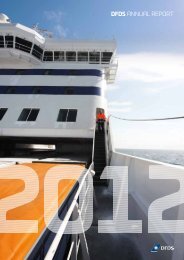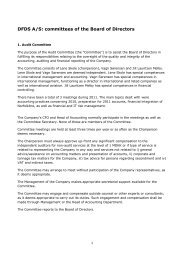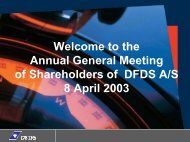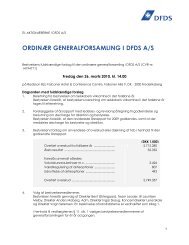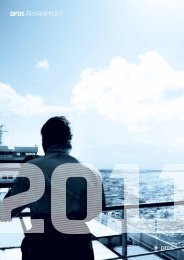English - DFDS
English - DFDS
English - DFDS
Create successful ePaper yourself
Turn your PDF publications into a flip-book with our unique Google optimized e-Paper software.
<strong>DFDS</strong> annual report 2009 Environmental report 43<br />
Comparison of bunker consumption per unit<br />
for older and modern/larger ships<br />
Ship<br />
Year built<br />
Length,<br />
metres<br />
Deadweight,<br />
tons<br />
Lane<br />
metres<br />
Consumption<br />
at 18 knots,<br />
g/nm/lm<br />
Tor Baltica 1977 169 9,700 1,870 58<br />
Tor Selandia 1998 198 11,080 2,770 48<br />
Tor Magnolia 2003 200 10,070 3,830 33<br />
Tor Ficaria<br />
(extended) 2006 230 14,600 4,650 29<br />
Baltic Sea and the North Sea. In the longer term, rules will be introduced<br />
that reduce sulphur content in bunker to 0.1 % in 2015.<br />
New environmental technology<br />
Technologies are also being developed to reduce the sulphur content<br />
of bunker on board ships. <strong>DFDS</strong> is collaborating with Aalborg<br />
Industries and MAN Diesel to develop a so-called “scrubber” that can<br />
remove 98 % of sulphur and 70 % of the particles from emissions. In<br />
2010, one such scrubber, which consists of approximately 30 tons of<br />
heavy plant, will be tested as part of the exhaust system on Tor Ficaria.<br />
If it lives up to expectations, the scrubber will be a significant tool<br />
for reducing emissions of sulphur and particles, particularly in urban<br />
areas. The method may also be an alternative to using bunker with<br />
low sulphur content, as the scrubber is expected to be able to reduce<br />
sulphur emissions to at least the same level.<br />
NOx: Ships’ engines expel varying degrees of NOx (nitrogen oxides)<br />
from combustion. These emissions are caused by the combustion temperature,<br />
and newer engines are designed to operate at temperatures<br />
that reduce NOx. Emissions are therefore reduced on modern ships<br />
like Tor Fionia, Tor Jutlandia, Tor Corona and Tor Hafnia.<br />
NOx emissions are a particular problem in and around ports.<br />
Ships calling at terminals close to urban and residential areas in Oslo<br />
and Copenhagen therefore use catalytic converters to purify smoke<br />
from their auxiliary engines, which produce power for onboard<br />
consumption.<br />
Another way to reduce emissions of harmful substances while<br />
in port is to use land-based sources of power. This is only possible<br />
in ports that provide power through special coupling points on the<br />
quay. This possibility is currently being assessed, e.g. in Gothenburg, in<br />
collaboration with the port company. At the same time, several options<br />
are being evaluated for environmentally friendly onboard power<br />
generation.<br />
2009. The latter is an as yet unratified international regulatory framework<br />
designed to ensure responsible scrapping of ships. It is expected<br />
to come into force in 2013. <strong>DFDS</strong> supports this convention and other<br />
initiatives that, in the meantime, ensure that ships are scrapped in a<br />
responsible fashion in relation to both the surrounding environment<br />
and the working environment. This policy formed the basis for the sale<br />
in early 2010 of a ro-ro ship, Tor Anglia, for scrap to the environmentally<br />
certified Jiangmen Yinhu shipyard in China.<br />
Battery-powered eco-friendly canal boats<br />
<strong>DFDS</strong>’ subsidiary <strong>DFDS</strong> Canal Tours operates tour boats in the Port<br />
of Copenhagen and the canals in the centre of the city. The engine<br />
noise and exhaust fumes of the boats place a strain on the surrounding<br />
urban environment, and <strong>DFDS</strong> has decided to develop and deploy<br />
a battery-powered boat, which is recharged at night when the proportion<br />
of environmentally friendly produced electricity is highest. The<br />
first of these emission- and noise-free boats has been delivered and<br />
will be operational from the start of the 2010 season. If the el-boat<br />
lives up to expectations, ships of this type are expected gradually to<br />
replace the existing boats.<br />
Other priorities<br />
Work is also being systematically carried out on the processing of<br />
waste and sewage from ships under the rules of the countries in<br />
which they dock. In addition, further work is being done to reduce<br />
noise during calls and stays in port.<br />
Certification<br />
<strong>DFDS</strong> has subsidiaries in several countries in Northern Europe, and<br />
does not currently have joint environmental certification for the whole<br />
Group, but various forms of certification in the various companies.<br />
<strong>DFDS</strong> has therefore decided to attain joint ISO 14001 environmental<br />
certification. The process has already started on the ro-ro routes from<br />
Gothenburg to Great Britain, Norway and the Continent. Once this<br />
work has been completed, the certification will be gradually extended<br />
to other parts of the Group.<br />
Environmentally friendly scrap<br />
It is <strong>DFDS</strong>’ policy to only sell ships for scrap when it can be guaranteed<br />
that the scrapping will be in accordance with national and international<br />
legislation, and in accordance with the intentions of the Hong<br />
Kong Convention agreed under the auspices of the IMO in October


